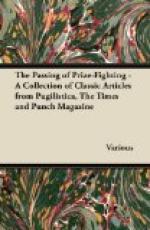And in his chair he shook,
And could no more rejoice;
All bloodless wax’d his look,
And tremulous his voice.
“What words are those appear,
To mar my fancied mirth!
What bringeth ‘Glory’ here
To tell of faded worth?”
“False renegade! thy name
Was once the star which led
The free; but, oh! what shame
Encircles now thine head!
Thou’rt in the balance weigh’d,
And worthless found at last.
All! all! thou hast betray’d!”—
And so the spirit pass’d.
* * * * *
PUNCH’S PENCILLINGS.—No. VI.
[Illustration:
ANIMAL MAGNETISM:
SIR RHUBARB PILL MESMERISING THE BRITISH LION.]
* * * * *
SUPREME COURT OF THE LORD HIGH INQUISITOR PUNCH.
PAT V. THE WHIG JUSTICE COMPANY.
This is a cause of thorough orthodox equity standing, having commenced before the time of legal memory, with every prospect of obtaining a final decree on its merits somewhere about the next Greek Kalends. In the present term,
COUNSELLOR BAYWIG moved, on the part of the plaintiff, who sues in forma pauperis, for an injunction to restrain the Whig Justice Company from setting a hungry Scotchman—one of their own creatures, without local or professional knowledge—over the lands of which the plaintiff is the legal, though unfortunately not the beneficial owner, as keeper and head manager thereof, to the gross wrong of the tenants, the depreciation of the lands themselves, the further reduction of the funds standing in the name of the cause, the insult to the feelings and the disregard of the rights of gentlemen living on the estate, and perfectly acquainted with its management; and finally, to an unblushing and barefaced denial of justice to all parties. The learned counsel proceeded to state, that the company, in order to make an excuse for thus saddling the impoverished estates with an additional incubus, had committed a double wrong, by forcing from the office a man eminently qualified to discharge its functions—who had lived and grown white with honourable years in the actual discharge of these functions—and by thrusting into his place their own needy retainer, who, instead of being the propounder of the laws which govern the estates, would be merely the apprentice to learn them; and this too at a time when the company was on the eve of bankruptcy, and when the possession which they had usurped so long was about to pass into the hands of their official assignees.
LORD HIGH INQUISITOR.—What authorities can you cite for this application?
COUNSELLOR BAYWIG.—My lord, I fear the cases are, on the whole, rather adverse to us. Men have, undoubtedly, been chosen to administer the laws of this fine estate, and to guard it from waste, who have studied its customs, been thoroughly learned in its statistics, and interested, by blood and connexion, in its prosperity; but this number is very small. However, when injustice of the most grievous kind is manifest, it should not be continued merely because it is the custom, or because it is an “old institution of the country.”




